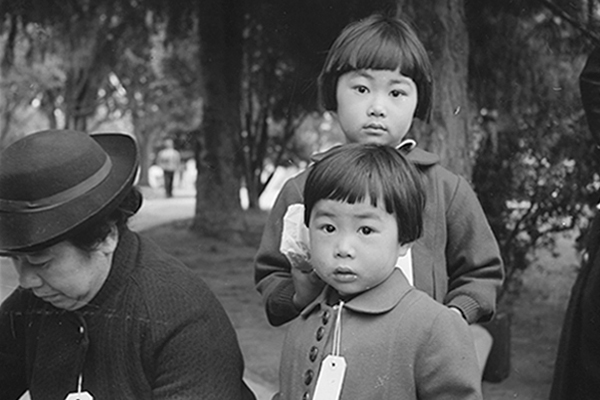
Two girls from the Mochida family wear identification tags during the removal of civilians of Japanese descent in Hayward, California, in May 1942. National Archives
Hitler’s government sought to violently redesign German society upon assuming power in 1933 by defining who belonged and who was excluded. During the same period, many in the United States saw America’s racial, religious, and ethnic identity in narrow and exclusive terms as well. In both Nazi Germany and the United States, leaders were determined to limit national belonging by denying civil rights and at times even stripping citizenship from those they sought to exclude. What were the similarities and differences between the two countries' views of race, rights, and belonging?
Speakers
Dr. Amanda Frost, Ann Loeb Bronfman Distinguished Professor of Law and Government, American University
Dr. Wolf Gruner, Shapell-Guerin Chair in Jewish Studies and Professor of History, University of Southern California, Founding Director, USC Dornsife Center for Advanced Genocide Research, Member, United States Holocaust Memorial Museum Academic Committee
This virtual discussion is free and open to the public. Registration is required to receive the link to watch.
For more information, contact Kierra Crago-Schneider at regional_campus_outreach@ushmm.org.
Joseph and Rebecca Meyerhoff were active philanthropists, focusing especially on Jewish learning and scholarship, as well as music, the arts, and humanitarian causes. Their children, Eleanor Katz and Harvey M. Meyerhoff, who is Member and Chairman Emeritus of the United States Holocaust Memorial Council, have endowed this lecture, which is organized by the United States Holocaust Memorial Museum’s Jack, Joseph and Morton Mandel Center for Advanced Holocaust Studies.
The United States Holocaust Memorial Museum’s Jack, Joseph and Morton Mandel Center’s mission is to ensure the long-term growth and vitality of Holocaust Studies. To do that, it is essential to provide opportunities for new generations of scholars. The vitality and the integrity of Holocaust Studies require openness, independence, and free inquiry so that new ideas are generated and tested through peer review and public debate. The opinions of scholars expressed before, during the course of, or after their activities with the Mandel Center do not represent and are not endorsed by the Museum or its Mandel Center.
